二十二届韩素音翻译大赛汉译英优秀译文
韩素音青翻译奖赛中文原文及参考译文和解析
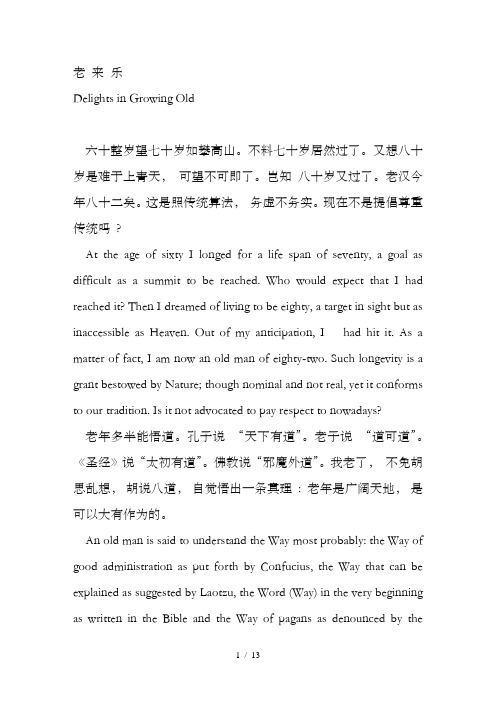
老来乐Delights in Growing Old六十整岁望七十岁如攀高山。
不料七十岁居然过了。
又想八十岁是难于上青天,可望不可即了。
岂知八十岁又过了。
老汉今年八十二矣。
这是照传统算法,务虚不务实。
现在不是提倡尊重传统吗?At the age of sixty I longed for a life span of seventy, a goal as difficult as a summit to be reached. Who would expect that I had reached it? Then I dreamed of living to be eighty, a target in sight but as inaccessible as Heaven. Out of my anticipation, I had hit it. As a matter of fact, I am now an old man of eighty-two. Such longevity is a grant bestowed by Nature; though nominal and not real, yet it conforms to our tradition. Is it not advocated to pay respect to nowadays?老年多半能悟道。
孔子说“天下有道”。
老子说“道可道”。
《圣经》说“太初有道”。
佛教说“邪魔外道”。
我老了,不免胡思乱想,胡说八道,自觉悟出一条真理: 老年是广阔天地,是可以大有作为的。
An old man is said to understand the Way most probably: the Way of good administration as put forth by Confucius, the Way that can be explained as suggested by Laotzu, the Word (Way) in the very beginning as written in the Bible and the Way of pagans as denounced by theBuddhists. As I am growing old, I can't help being given to flights of fancy and having my own Way of creating stories. However I have come to realize the truth: my old age serves as a vast world in which I can still have my talents employed fully and developed completely.七十岁开始可以诸事不做而拿退休金,不愁没有一碗饭吃,自由自在,自得其乐。
23届韩素音翻译竞赛英译汉原文
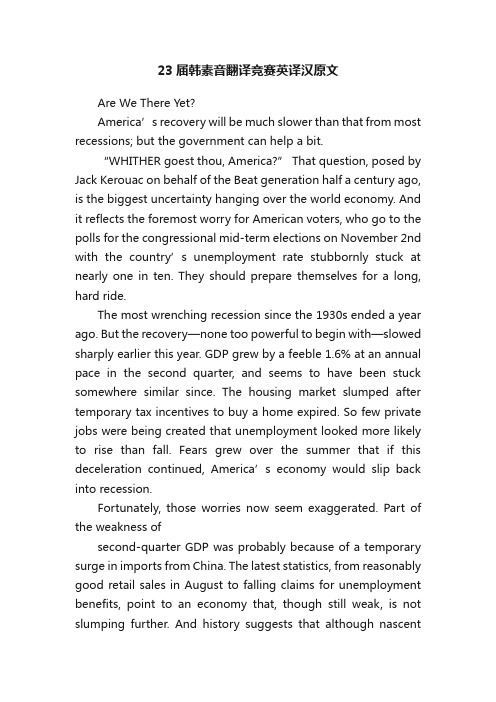
23届韩素音翻译竞赛英译汉原文Are We There Yet?America’s recovery will be much slower than that from most recessions; but the government can help a bit.“WHITHER goest thou, America?” That question, posed by Jack Kerouac on behalf of the Beat generation half a century ago, is the biggest uncertainty hanging over the world economy. And it reflects the foremost worry for American voters, who go to the polls for the congressional mid-term elections on November 2nd with the country’s unemployment rate stubbornly stuck at nearly one in ten. They should prepare themselves for a long, hard ride.The most wrenching recession since the 1930s ended a year ago. But the recovery—none too powerful to begin with—slowed sharply earlier this year. GDP grew by a feeble 1.6% at an annual pace in the second quarter, and seems to have been stuck somewhere similar since. The housing market slumped after temporary tax incentives to buy a home expired. So few private jobs were being created that unemployment looked more likely to rise than fall. Fears grew over the summer that if this deceleration continued, America’s economy would slip back into recession.Fortunately, those worries now seem exaggerated. Part of the weakness ofsecond-quarter GDP was probably because of a temporary surge in imports from China. The latest statistics, from reasonably good retail sales in August to falling claims for unemployment benefits, point to an economy that, though still weak, is not slumping further. And history suggests that although nascentrecoveries often wobble for a quarter or two, they rarely relapse into recession. For now, it is most likely that America’s economy will crawl along with growth at perhaps 2.5%: above stall speed, but far too slow to make much difference to the jobless rate.Why, given that America usually rebounds from recession, are the prospects so bleak? That’s because most past recessions have been caused by tight monetary policy. When policy is loosened, demand rebounds. This recession was the result of a financial crisis. Recoveries after financial crises are normally weak and slow as banking systems are repaired and balance-sheets rebuilt. Typically, this period of debt reduction lasts around seven years, which means America would emerge from it in 2014. By some measures, households are reducing their debt burdens unusually fast, but even optimistic seers do not think the process is much more than half over.Battling on the busAmerica’s biggest problem is that its politicians have yet to acknowledge that the economy is in for such a long, slow haul, let alone prepare for the consequences. A few brave officials are beginning to sound warnings that the jobless rate is likely to “stay high”. But the political debate is more about assigning blame for the recession than about suggesting imaginative ways to give more oomph to the recovery.Republicans argue that Barack Obama’s shift towards “big government” explains the economy’s weakness, and that high unemployment is proof that fiscal stimulus was a bad idea. In fact, most of the growth in government to date has been temporary and unavoidable; the longer-run growth in government is more modest, and reflects the policies of both Mr Obama and his predecessor. And the notion that high joblessness “proves”that stimulus failed is simply wrong. The mechan ics of a financial bust suggest that without a fiscal boost the recession would have been much worse.Democrats have their own class-warfare version of the blame game, in which Wall Street’s excesses caused the problem and higher taxes on high-earners are part of the solution. That is why Mr. Obama’s legislative priority before the mid-terms is to ensure that the Bush tax cuts expire at the end of this year for households earning more than $250,000 but are extended for everyone else.This takes an unnecessary risk with the short-term recovery. America’s experience in 1937 and Japan’s in 1997 are powerful evidence that ill-timed tax rises can tip weak economies back into recession. Higher taxes at the top, along with the waning of fiscal stimulus and belt-tightening by the states, will make a weak growth rate weaker still. Less noticed is that Mr. Obama’s fiscal plan will also worsen the medium-term budget mess, by making tax cuts for the middle class permanent.Ways to overhaul the engineIn an ideal world America would commit itself now to the medium-term tax reforms and spending cuts needed to get a grip on the budget, while leav ing room to keep fiscal policy loose for the moment. But in febrile, partisan Washington that is a pipe-dream. Today’s goals can only be more modest: to nurture the weak economy, minimize uncertainty and prepare the ground for tomorrow’s fiscal debate. To that end, Congress ought to extend all the Bush tax cuts until 2013. Then they should all expire—prompting a serious fiscal overhaul, at a time when the economy is stronger.A broader set of policies could help to work off the hangoverfaster. One priority is to encourage more write-downs of mortgage debt. Almost a quarter of all Americans with mortgages owe more than their houses are worth. Until that changes the vicious cycle of rising foreclosures and falling prices will continue. There are plenty of ideas on offer, from changing the bankruptcy law so that judges can restructure mortgage debt to empowering special trustees to write down loans. They all have drawbacks, but a fetid pool of underwater mortgages will, much like Japan’s loans to zombie firms, corrode the financial system and harm the recovery.Cleaning up the housing market would help cut America’s unemployment rate, by making it easier for people to move to where jobs are. But more must be done to stop high joblessness becoming entrenched. Payroll-tax cuts and credits to reduce the cost of hiring would help. (The health-care reform, alas, does the opposite, at least for small businesses.)Politicians will also have to think harder about training schemes, because some workers lack the skills that new jobs require.Americans are used to great distances. The sooner they, and their politicians, accept that the road to recovery will be a long one, the faster they will get there.。
韩素音英译汉原文

Outing A.I.: Beyond the Turing TestThe idea of measuring A.I. by its ability to “pass” as a human – dramatized in countless scifi films – is actually as old as modern A.I. research itself. It is traceable at least to 1950 when the British mathematician Alan Turing published “Computing Machinery and Intelligence,” a paper in which he described what we now call the “Turing Test,” and which he referred to as the “imitation game.” There are different versions of the test, all of which are revealing as to why our approach to the culture and ethics of A.I. is what it is, for good and bad. For the most familiar version, a human interrogator asks questions of two hidden contestants, one a human and the other a computer. Turing suggests that if the interrogator usually cannot tell which is which, and if the computer can successfully pass as human, then can we not conclude, for practical purposes, that the computer is “intelligent”?More people “know” Turing’s foundational text than have actually read it. This is unfortunate because the text is marvelous, strange and surprising. Turing introduces his test as a variation on a popular parlor game in which two hidden contestants, a woman (player A) and a man (player B) try to convince a third that he or she is a woman by their written responses to leading questions. To win, one of the players must convincingly be who they really are, whereas the other must try to pass as another gender. Turing describes his own variation as one where “a computer takes the place of player A,” and so a literal reading would suggest that in his version the computer is not just pretending to be a human, but pretending to be a woman. It must pass as a she.Passing as a person comes down to what others see and interpret. Because everyone else is already willing to read others according to conventional cues (of race, sex, gender, species, etc.) the complicity between whoever (or whatever) is passing and those among which he or she or it performs is what allows passing to succeed. Whether or not an A.I. is trying to pass as a human or is merely in drag as a human is another matter. Is the ruse all just a game or, as for some people who are compelled to pass in their daily lives, an essential camouflage? Either way, “passing” may say more about the audience than about the performers.That we would wish to define the very existence of A.I. in relation to its ability to mimic how humans think that humans think will be looked back upon as a weird sort of speciesism. The legacy of that conceit helped to steer some older A.I. research down disappointingly fruitless paths, hoping to recreate human minds from available parts. It just doesn’t work that way. ContemporaryA.I. research suggests instead that the threshold by which any particular arrangement of matter can be said to be “intelligent” doesn’t have much to do with how it reflects humanness back at us. As Stuart Russell and Peter Norvig (now director of research at Google) suggest in their essential A.I. textbook, biomorphic imitation is not how we design complex technology. Airplanes don’t fly like birds fly, and we certainly don’t try to trick birds into thinking that airplanes are birds in order to test whether those planes “really” are flying machines. Why do it for A.I. then? Today’s serious A.I. research does not focus on the Turing Test as an objective criterion of success, and yet in our popular culture of A.I., the test’s anthropocentrism holds such durable conceptual importance. Like the animals who talk like teenagers in a Disney movie, other minds are conceivable mostly by way of puerile ventriloquism.Where is the real injury in this? If we want everyday A.I. to be congenial in a humane sort of way, so what? The answer is that we have much to gain from a more sincere and disenchanted relationship to synthetic intelligences, and much to lose by keeping illusions on life support. Some philosophers write about the possible ethical “rights” of A.I. as sentient entities, but that’s not my point here. Rather, the truer perspective is also the better one for us as thinking technical creatures.Musk, Gates and Hawking made headlines by speaking to the dangers that A.I. may pose. Their points are important, but I fear were largely misunderstood by many readers. Relying on efforts to program A.I. not to “harm humans” (inspired by Isaac Asimov’s “three laws” of robotics from 1942) makes sense only when an A.I. knows what humans are and what harming them might mean. There are many ways that an A.I. might harm us that have nothing to do with its malevolence toward us, and chief among these is exactly following our well-meaning instructions to an idiotic and catastrophic extreme. Instead of mechanical failure or a transgression of moral code, the A.I. may pose an existential risk because it is both powerfully intelligent and disinterested in humans. To the extent that we recognize A.I. by its anthropomorphic qualities, or presume its preoccupation with us, we are vulnerable to those eventualities.Whether or not “hard A.I.” ever appears, the harm is also in the loss of all that we prevent ourselves from discovering and understanding when we insist on protecting beliefs we know to be false. In the 1950 essay, Turing offers several rebuttals to his speculative A.I., including a striking comparison with earlier objections to Copernican astronomy. Copernican traumas that abolish the false centrality and absolute specialness of human thought and species-being are pricelessaccomplishments. They allow for human culture based on how the world actually is more than on how it appears to us from our limited vantage point. Turing referred to these as “theological objections,” but one could argue that the anthropomorphic precondition for A.I. is a“pre-Copernican” attitude as well, however secular it may appear. The advent of robust inhuman A.I. may let us achieve another disenchantment, one that should enable a more reality-based understanding of ourselves, our situation, and a fuller and more complex understanding of what “intelligence” is and is not. From there we can hopefully make our world with a greater confidence that our models are good approximations of what’s out there.。
第二十二届韩素音青年翻译奖参考译文
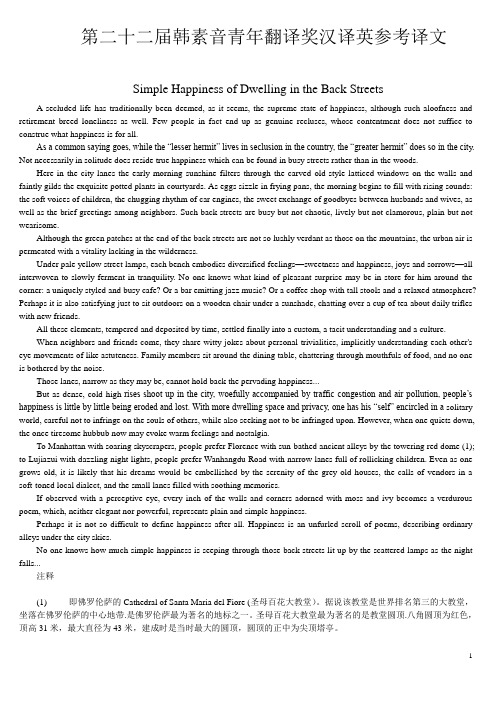
第二十二届韩素音青年翻译奖汉译英参考译文Simple Happiness of Dwelling in the Back StreetsA secluded life has traditionally been deemed, as it seems, the supreme state of happiness, although such aloofness and retirement breed loneliness as well. Few people in fact end up as genuine recluses, whose contentment does not suffice to construe what happiness is for all.As a common saying goes, while the “lesser hermit” lives in seclusion in the country, the “greater hermit” does so in the cit y. Not necessarily in solitude does reside true happiness which can be found in busy streets rather than in the woods.Here in the city lanes the early morning sunshine filters through the carved old-style latticed windows on the walls and faintly gilds the exquisite potted plants in courtyards. As eggs sizzle in frying pans, the morning begins to fill with rising sounds: the soft voices of children, the chugging rhythm of car engines, the sweet exchange of goodbyes between husbands and wives, as well as the brief greetings among neighbors. Such back streets are busy but not chaotic, lively but not clamorous, plain but not wearisome.Although the green patches at the end of the back streets are not so lushly verdant as those on the mountains, the urban air is permeated with a vitality lacking in the wilderness.Under pale yellow street lamps, each bench embodies diversified feelings—sweetness and happiness, joys and sorrows—all interwoven to slowly ferment in tranquility. No one knows what kind of pleasant surprise may be in store for him around the corner: a uniquely styled and busy cafe? Or a bar emitting jazz music? Or a coffee shop with tall stools and a relaxed atmosphere? Perhaps it is also satisfying just to sit outdoors on a wooden chair under a sunshade, chatting over a cup of tea about daily trifles with new friends.All these elements, tempered and deposited by time, settled finally into a custom, a tacit understanding and a culture.When neighbors and friends come, they share witty jokes about personal trivialities, implicitly understanding each other's eye movements of like astuteness. Family members sit around the dining table, chattering through mouthfuls of food, and no one is bothered by the noise.Those lanes, narrow as they may be, cannot hold back the pervading happiness...But as dense, cold high-rises shoot up in the city, woefully accompanied by traffic congestion and air pollution, people’s happiness is little by little being eroded and lost. With more dwelling space and privacy, one has his “self” encircled in a solitary world, careful not to infringe on the souls of others, while also seeking not to be infringed upon. However, when one quiets dow n, the once tiresome hubbub now may evoke warm feelings and nostalgia.To Manhattan with soaring skyscrapers, people prefer Florence with sun-bathed ancient alleys by the towering red dome (1); to Lujiazui with dazzling night lights, people prefer Wanhangdu Road with narrow lanes full of rollicking children. Even as one grows old, it is likely that his dreams would be embellished by the serenity of the grey old houses, the calls of vendors in a soft-toned local dialect, and the small lanes filled with soothing memories.If observed with a perceptive eye, every inch of the walls and corners adorned with moss and ivy becomes a verdurous poem, which, neither elegant nor powerful, represents plain and simple happiness.Perhaps it is not so difficult to define happiness after all. Happiness is an unfurled scroll of poems, describing ordinary alleys under the city skies.No one knows how much simple happiness is seeping through those back streets lit up by the scattered lamps as the night falls...注释(1) 即佛罗伦萨的Cathedral of Santa Maria del Fiore (圣母百花大教堂)。
2022韩素音国际翻译大赛(英译汉)二等奖译文
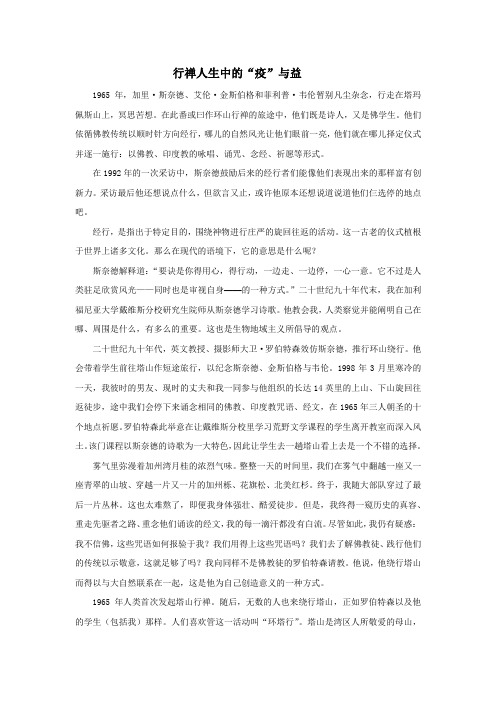
行禅人生中的“疫”与益1965年,加里·斯奈德、艾伦·金斯伯格和菲利普·韦伦暂别凡尘杂念,行走在塔玛佩斯山上,冥思苦想。
在此番或曰作环山行禅的旅途中,他们既是诗人,又是佛学生。
他们依循佛教传统以顺时针方向经行,哪儿的自然风光让他们眼前一亮,他们就在哪儿择定仪式并逐一施行:以佛教、印度教的咏唱、诵咒、念经、祈愿等形式。
在1992年的一次采访中,斯奈德鼓励后来的经行者们能像他们表现出来的那样富有创新力。
采访最后他还想说点什么,但欲言又止,或许他原本还想说道说道他们仨选停的地点吧。
经行,是指出于特定目的,围绕神物进行庄严的旋回往返的活动。
这一古老的仪式植根于世界上诸多文化。
那么在现代的语境下,它的意思是什么呢?斯奈德解释道:“要诀是你得用心,得行动,一边走、一边停,一心一意。
它不过是人类驻足欣赏风光——同时也是审视自身——的一种方式。
”二十世纪九十年代末,我在加利福尼亚大学戴维斯分校研究生院师从斯奈德学习诗歌。
他教会我,人类察觉并能阐明自己在哪、周围是什么,有多么的重要。
这也是生物地域主义所倡导的观点。
二十世纪九十年代,英文教授、摄影师大卫·罗伯特森效仿斯奈德,推行环山绕行。
他会带着学生前往塔山作短途旅行,以纪念斯奈德、金斯伯格与韦伦。
1998年3月里寒冷的一天,我彼时的男友、现时的丈夫和我一同参与他组织的长达14英里的上山、下山旋回往返徒步,途中我们会停下来诵念相同的佛教、印度教咒语、经文,在1965年三人朝圣的十个地点祈愿。
罗伯特森此举意在让戴维斯分校里学习荒野文学课程的学生离开教室而深入风土。
该门课程以斯奈德的诗歌为一大特色,因此让学生去一趟塔山看上去是一个不错的选择。
雾气里弥漫着加州湾月桂的浓烈气味。
整整一天的时间里,我们在雾气中翻越一座又一座青翠的山坡、穿越一片又一片的加州栎、花旗松、北美红杉。
终于,我随大部队穿过了最后一片丛林。
这也太难熬了,即便我身体强壮、酷爱徒步。
历届韩素音翻译大奖赛竞赛原文及译文
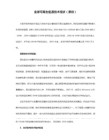
历届韩素音翻译大奖赛竞赛原文及译文英译汉部分 (3)Beauty (excerpt) (3)美(节选) (3)The Literature of Knowledge and the Literature of Power byThomas De Quincey (8)知识文学与力量文学托马斯.昆西 (8)An Experience of Aesthetics by Robert Ginsberg (11)审美的体验罗伯特.金斯伯格 (11)A Person Who Apologizes Has the Moral Ball in His Court by Paul Johnson (14)谁给别人道歉,谁就在道义上掌握了主动保罗.约翰逊 (14)On Going Home by Joan Didion (18)回家琼.狄迪恩 (18)The Making of Ashenden (Excerpt) by Stanley Elkin (22)艾兴登其人(节选)斯坦利.埃尔金 (22)Beyond Life (28)超越生命[美] 卡贝尔著 (28)Envy by Samuel Johnson (33)论嫉妒[英]塞缪尔.约翰逊著 (33)中译英部分 (37)在义与利之外 (37)Beyond Righteousness and Interests (37)读书苦乐杨绛 (40)The Bitter-Sweetness of Reading Yang Jiang (40)想起清华种种王佐良 (43)Reminiscences of Tsinghua Wang Zuoliang (43)歌德之人生启示宗白华 (45)What Goethe's Life Reveals by Zong Baihua (45)怀想那片青草地赵红波 (48)Yearning for That Piece of Green Meadow by Zhao Hongbo (48)可爱的南京 (51)Nanjing the Beloved City (51)霞冰心 (53)The Rosy Cloud byBingxin (53)黎明前的北平 (54)Predawn Peiping (54)老来乐金克木 (55)Delights in Growing Old by Jin Kemu (55)可贵的“他人意识” (58)Calling for an Awareness of Others (58)教孩子相信 (61)To Implant In Our Children’s Young Hearts An Undying Faith In Humanity (61)英译汉部分Beauty (excerpt)美(节选)Judging from the scientists I know, including Eva and Ruth, and those whom I've read about, you can't pursue the laws of nature very long without bumping撞倒; 冲撞into beauty. “I don't know if it's the same beauty you see in the sunset,”a friend tells me, “but it feels the same.”This friend is a physicist, who has spent a long career deciphering破译(密码), 辨认(潦草字迹) what must be happening in the interior of stars. He recalls for me this thrill on grasping for the first time Dirac's⑴equations describing quantum mechanics, or those of Einstein describing relativity. “They're so beautiful,” he says, “you can see immediately they have to be true. Or at least on the way toward truth.” I ask him what makes a theory beautiful, and he replies, “Si mplicity, symmetry .对称(性); 匀称, 整齐, elegance, and power.”我结识一些科学家(包括伊娃和露丝),也拜读过不少科学家的著作,从中我作出推断:人们在探求自然规律的旅途中,须臾便会与美不期而遇。
第二十二届韩素音青年翻译奖竟赛英译汉译文和译文评析

英译汉Hidden Within Technology’s Empire, a Republic of Letters隐藏于技术帝国的文学界索尔•贝妻When I was a boy “discovering literature”, I used to think how wonderful it would be if every other person on the street were familiar with Proust and Joyce or T. E. Lawrence or Pasternak and Kafka. Later I learned how refractory to high culture the democratic masses were. Lincoln as a young frontiersman read Plutarch, Shakespeare and the Bible. But then he was Lincoln.我还是个"探索文学"的少年时,就经常在想:要是大街上人人都熟悉普鲁斯特和乔伊斯,熟悉T.E.劳伦斯,熟悉帕斯捷尔纳克和卡夫卡,该有多好啊!后来才知道,平民百姓对高雅文化有多排斥。
虽说少年时代身居边陲的林肯就在阅读普鲁塔克,、莎士比亚和《圣经》,但他毕竟是林肯。
Later when I was traveling in the Midwest by car, bus and train, I regularly visited small-town libraries and found that readers in Keokuk, Iowa, or Benton Harbor, Mich., were checking out Proust and Joyce and even Svevo and Andrei Biely. D. H. Lawrence was also a favorite. And sometimes I remembered that God was willing to spare Sodom for the sake of 10 of the righteous. Not that Keokuk was anything like wicked Sodom, or that Proust’s Charlus would have been tempted to settle in Benton Harbor, Mich. I seem to have had a persistent democratic desire to find evidences of high culture in the most unlikely places.后来,我坐小车、巴士和火车在中西部旅行,经常走访小镇图书馆;发现在衣阿华州基奥卡克市,或者密歇根州本顿港市,读者们借阅普鲁斯特和乔伊斯的作品,甚至还有斯维沃@和安德烈•别雷®的著作。
24届韩素音青年翻译奖汉译英

Language and Social StatusOne's language is inseparable from the its identity in the society. I still remembered that a neighbour got up early to practice the pronunciation everyday in order to make his sounds euphonic, when I lived in Australia.Indeed, the language is the sign of one's social status, especially in the multi-national and multi-cultural society. The so-called "identity", is also a kind of knowledge structure, indicating the cultural background of the social group where you come from, the knowledge degree and even the geographical position.The language will influence the corresponding cultural cognition. For example, the research finds that, for the bilingual chinese, when asked about the cultural concepts in chinese, their answers are more apparent to reveal the chinese styles than asked such problems in English. Interestingly, when Hong Kong and Macao people who speak cantonese are asked about china's culture and religion in mandarin, their answers are always more close to the ways of westerners express than in cantonese with the same questions.In fact, for the chinese learning foreign languages, the majority are not the real sense of so-called "bilingual people", but "bilingual users"; The latter is in the language and the expression level, but the former is in thinking and life habits. However, this process is not still, but can be converted.Therefore, the study of language learners, is in fact a kind of social relations, which he understands and forms across the space and time.Thus, he faces is not only the linguistics, but the multiple, changing social status.Research also shows that a person's speech style is not aptotic, but it will change as the changes of the social environment and the people he talks to. In general, the personal speech has a tendency to convergence (that is, follow the crowd), but sometimes it also have divergent tendency (that is to show their own characteristics). For example, when I went back to Beijing, my "Beijing tone" becomes strong a lot; And when my English friends in Australia, his "anglicisms" remains more apparent. I don't know whether it is deliberately to show its identity.During the process of people adapting to the exotic culture, his attitudes to thenative language also have a positive or negative choices. Some people, when they are active in the other mainstream cultures at the same time, they are inclined to weaken their own native language ability; However, some people, strengthen this aspect, thinking this is an advantage.Generally speaking, if the language that a certain social groups speak is for some kind of social respect(such as in England, the language spoken the noble as a representative of the queen.),it will have a higher social superiority. And its members also might show distinvtive, in order to keep with its positive group characteristics. Of course, it is inevitable to have others draw close way of speaking to this group.A man's language also can become the evaluation of other objects. According to the research, people can judge his social position, education level, kind or not, intelligence, ability and even wealth from the language and so on.Visibly, language has the meaning to the individual. If the clothing is the body's modification, then the language is the external expression of one's comprehensive value. Therefore, the language should not only be regarded as a tool, but a kind of quality.。
- 1、下载文档前请自行甄别文档内容的完整性,平台不提供额外的编辑、内容补充、找答案等附加服务。
- 2、"仅部分预览"的文档,不可在线预览部分如存在完整性等问题,可反馈申请退款(可完整预览的文档不适用该条件!)。
- 3、如文档侵犯您的权益,请联系客服反馈,我们会尽快为您处理(人工客服工作时间:9:00-18:30)。
汉译英原文:
居在巷陌的寻常幸福
隐逸的生活似乎在传统意识中一直被认为是幸福的至高境界。
但这种孤傲遁世同时也是孤独的,纯粹的隐者实属少数,而少数者的满足不能用来解读普世的幸福模样。
有道是小隐隐于野,大隐隐于市。
真正的幸福并不隐逸,可以在街市而不是丛林中去寻找。
晨光,透过古色古香的雕花窗棂,给庭院里精致的盆景慢慢地化上一抹金黄的淡妆。
那煎鸡蛋的“刺啦”声袅袅升起,空气中开始充斥着稚嫩的童音、汽车
启动的节奏、夫妻间甜蜜的道别,还有邻居们简单朴素的问好。
巷陌中的这一切,忙碌却不混乱,活泼却不嘈杂,平淡却不厌烦。
巷尾的绿地虽然没有山野的苍翠欲滴,但是空气中弥漫着荒野中所没有的
生机。
微黄的路灯下,每一张长椅都写着不同的心情,甜蜜与快乐、悲伤与喜悦,交织在一起,在静谧中缓缓发酵。
谁也不会知道在下一个转角中会是怎样的惊喜,会是一家风格独特食客不断的小吃店?是一家放着爵士乐的酒吧?还是一家摆着高脚木凳、连空气都闲散的小小咖啡馆?坐在户外撑着遮阳伞的木椅上,
和新认识的朋友一边喝茶,一边谈着自己小小的生活,或许也是一种惬意。
一切,被时间打磨,被时间沉淀,终于形成了一种习惯,一种默契,一种文化。
和来家中做客的邻居朋友用同一种腔调巧妙地笑谑着身边的琐事,大家眯起的眼睛都默契地着同一种狡黠;和家人一起围在饭桌前,衔满食物的嘴还发着
含糊的声音,有些聒噪,但没人厌烦。
小巷虽然狭窄,却拉不住快乐蔓延的速度……
随着城市里那些密集而冰冷的高楼大厦拔地而起,在拥堵的车流中,在污
浊的空气里,人们的幸福正在一点点地破碎,飘零。
大家住得越来越宽敞,越来越私密。
自我,也被划进一个单独的空间里,小心地不去触碰别人的心灵,也
不容许他人轻易介入。
可是,一个人安静下来时会觉得,曾经厌烦的那些嘈杂回想起来很温情很怀念。
比起高楼耸立的曼哈顿,人们更加喜欢佛罗伦萨红色穹顶下被阳光淹没的古老巷道;比起在夜晚光辉璀璨的陆家嘴,人们会更喜欢充满孩子们打闹嬉笑的万航渡路。
就算已苍然老去,支撑起梦境的应该是老房子暗灰的安详,吴侬软语的叫卖声,那一方氤氲过温馨和回忆的小弄堂。
如果用一双细腻的眼眸去观照,其实每一片青苔和爬山虎占据的墙角,是
墨绿色的诗篇,不会飘逸,不会豪放,只是那种平淡的幸福,简简单单。
幸福是什么模样,或许并不难回答。
幸福就是一本摊开的诗篇,关于在城市的天空下,那些寻常巷陌的诗。
夜幕笼罩,那散落一地的万家灯火中,有多少寻常的幸福正蜗居在巷陌……
Dwelling in the Alleys, a Plain Happiness
It seems that, in the traditional sense, a life of recluse has long been considered as the supreme state of happiness. However, this kind of proud withdrawal from the world is meanwhile lonely. In fact, there are few unadulterated recluses. And the satisfaction of the few cannot be used to interpret the universal condition of happiness.
As the saying goes, the inferior recluse hides away in the wild; the superior, crowd”. Real happiness, which does not live in seclusion, can be found in the downtown rather than in the forest.
Rays of the morning glow, penetrating the quaintly carved window lattice, little by little, put on a stroke of light make-up in golden yellow for the delicate potted landscapes in the courtyard. With the sizzling sound of frying eggs curling upwards, the air begins to be filled with various sounds: the tender voices of children, the starting-up rhythm of cars’engines, the sweetly-said good-byes between couples, the simple greetings among neighbors…All these things in the alleys are busy yet not chaotic, lively yet not clamorous, plain yet not boring.
While the green plots at the end of the alleys are not as verdant and juicy as those in the wild, the vitality that overflows in the air can never be found in the latter. In the pale yellow light of street lamps, every settee is inscribed with a different mood- sweetness, happiness, sorrow, or delight- which mingles with each other and slowly ferments in placidity. Who knows what surprise will crop up at the next street corner?
An eatery with an exotic style and ceaseless flow of customers? A bar with jazz on? Or a small café with high-legged wooden stools and a leisure atmosphere? To be seated on a wooden chair under a parasol in the open air, talking with
newly-acquainted friends about one’s own trivial life over a cup of tea, is probably a pleasure, too.
Everything, polished and deposited by time, eventually becomes a habit, a mutuality, a culture.
At home, together with visiting neighboring friends, people joke about trifling matters around in the same clever manner, everyone’s narrowed eyes glimmering with the same craftiness in tacit agreement; at the family gathering around the dining table, stuffed mouths mumble, somewhat noisily, yet no one is bothered.
Cramp ed as the alleys are, happiness there pervades regardless…
As the dense, cold high-rises sprout up in the cities, the traffic congests, the air fouls, and bit by bit, people’s happiness is tattering and dying away. People’s living space is becoming more and more commodious, yet less and less communal. One’s self, enclosed in an exclusive space, carefully avoids touching other people’s hearts while forbidding their rash access. Nevertheless, the time when one quietens down
and thinks back, one would miss the cozy racket that used to be so annoying.
Compared with Manhattan with all its towering buildings, people prefer Florence, under whose red domes ancient alleys are submerged in the sunlight; compared with the radiant Lujiazui at night, people would prefer Wanhangdu Road, which is。
